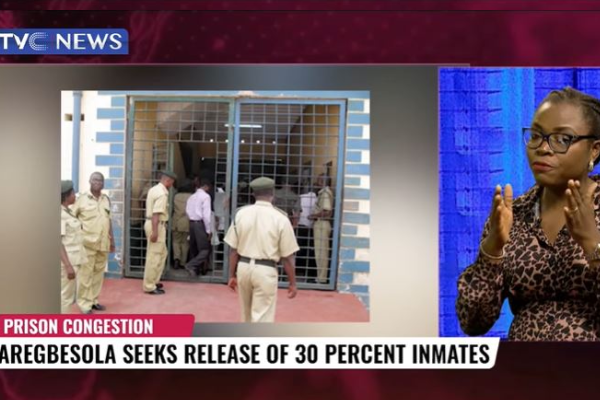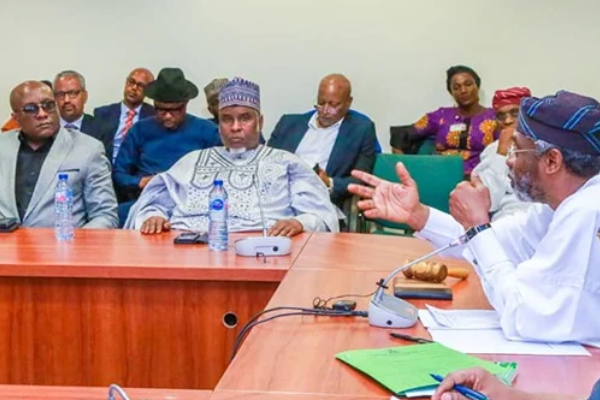For a long time, de-congesting correctional facilities across the country has come up in conversations because many of these holding structures are overstretched with inmates beyond their original retention capacity.
Presently, Nigeria has 253 custodial centers nationwide with a holding capacity of slightly above 50,000. But at the moment, over 75000 people are being held in these facilities.
These and several other reasons are why the Minister of Interior, Rauf Aregbesola, is seeking the release of at least 30% of inmates from custodial centers across the country.
[wonderplugin_video iframe=”https://youtu.be/5hEuozrYGE4″ lightbox=0 lightboxsize=1 lightboxwidth=960 lightboxheight=540 autoopen=0 autoopendelay=0 autoclose=0 lightboxtitle=”” lightboxgroup=”” lightboxshownavigation=0 showimage=”” lightboxoptions=”” videowidth=600 videoheight=400 keepaspectratio=1 autoplay=0 loop=0 videocss=”position:relative;display:block;background-color:#000;overflow:hidden;max-width:100%;margin:0 auto;” playbutton=”https://www.tvcnews.tv/wp-content/plugins/wonderplugin-video-embed/engine/playvideo-64-64-0.png”]
According to the minister, 70% of the 75,635 that’s 51,541 of the inmates are awaiting trial. He also shared his concern on the fact that some of the inmates have no reason to remain in custody as they had waited for their day in court even longer than the punishment provided by law for the crimes they committed.
Mr Aregbesola said achieving these feats can only be made possible with cooperation from state governors, as many offenders have been held for contravening state laws.
Speaking on the major causes of congestion of prisons across the country on TVC Breakfast, Joke Aladesami, Executive Director, center for Legal Support and Inmate Rehabilitation said reasons for overcrowding cannot be focused on one factor, rather, the issue should be examined from the time of arrest through the time of conviction.
She noted that from the standpoint of switch arrests, the case has been taken to the Magistrate Court, and then from the Magistrate Court to the High Court. There is a small amount of delay that occurs.
“In addition, there are problems with legal representation, as many people lack the resources to hire attorneys to represent them in court and of course, there are also the court’s delays.
“The delay in justice as well has contributed to the congestion of the prison,” she added.
Aladesami noted that to have a holistic decongestion, we need to look at a general approach to resolving the problem which goes beyond a mass release.
According to her, a mass release is good as it is an emergency option that needs to be used at a time like this especially as the country’s prisons are already over congested.
“The mass release is something that needs to be considered. But we need to look beyond just mass release. We need to start looking at how to ensure that we don’t find ourselves there again.
“We also need to start looking at our laws. There’s a provision in the Major Corruption of Service Act that talks about non custodian measures, and the Minister of Interior has also talked about having a lot of petty offenders in the prison.
“Non-custodial measures also needs to be looked at where people who are charged for petty offenses can actually serve other punishments beyond just being remanded, and being imprisoned.
“It is also high time for our correctional facilities to start upping their games when it comes to rehabilitation, the facility is not just to hold.
Speaking on ways correctional facilities can be decongested, she Aladesami said while inmates are being held for a number of years, they should be rehabilitated, given opportunities to become better persons so that by the time come out, they will become more productive and positive.
The world is beginning to talk of restorative justice where you’re not just looking at your offender, but also at the victim as well, where matters can be resolved without necessarily having to go to the court
Nigeria has to join the world’s conversation as regard restorative justice, rehabilitation of these incarcerated individuals.
Talking about the issue of compensation for individuals who have been wrongly profiled, Aladesami said these are matters civil organisations are beginning to discuss but one of the challenges faced is the number of people who are faced with these consequences which will be overwhelming on the government.
“The consequences of incarceration does not know the innocence.
“As far as you’re arrested and you’re kept behind bars or you’re kept at a correctional facility, whether you’re eventually discharged and acquitted after ten years, the effect of that ten years, you have to suffer it.
“We’re getting to that stage where we are saying, someone needs to be held accountable. You can’t just keep people wasting their lives away. These are young people.
Aladesami stated that many people have received compensation, particularly when there is a violation of a fundamental human right.
There is a widespread misconception that the only thing incarcerated people require is freedom.
“Nobody is talking about what their lives are like behind bars, what their lives are like after they get out, and the issues they face.
“Until we begin looking at these three phases of while they are incarcerated, their release, and what happens to their lives after release, we may not be able to effectively solve the problem that plagues our criminal justice system.
“We need to start looking at effective ways of actually decongesting,” she said.





